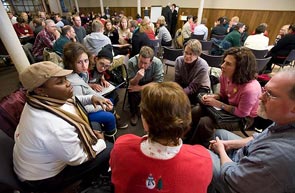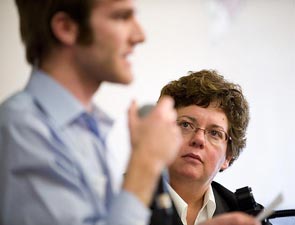The week’s third brainstorming session drew a crowd of more than 70 people who trudged through the 12 inches of snow that fell just hours earlier.
Chancellor Martin said the campus needs to find new ways of operating in the face of a souring economy.
“We’re just looking for opportunities, in the face of such an economic crisis, to do things differently,” she said. “What opportunities do we have to do things differently in a way that’s effective and efficient?”
Throughout the week, several individuals spoke to the importance of focus as the campus establishes its priorities and sets its goals under economic pressure.
David Ruhde, an information technology leader at DoIT, summarized those feelings well.
“We can do great things here, and this is an opportunity to show that,” he said. “We have a powerful organization, and we can do great things if we focus on what we can deliver.”
The chancellor agreed, saying it was essential to maintain UW-Madison’s pre-eminence in research and academics.
“We can’t do everything well,” she said in her closing remarks. “We have to identify our strengths and protect them well.”


